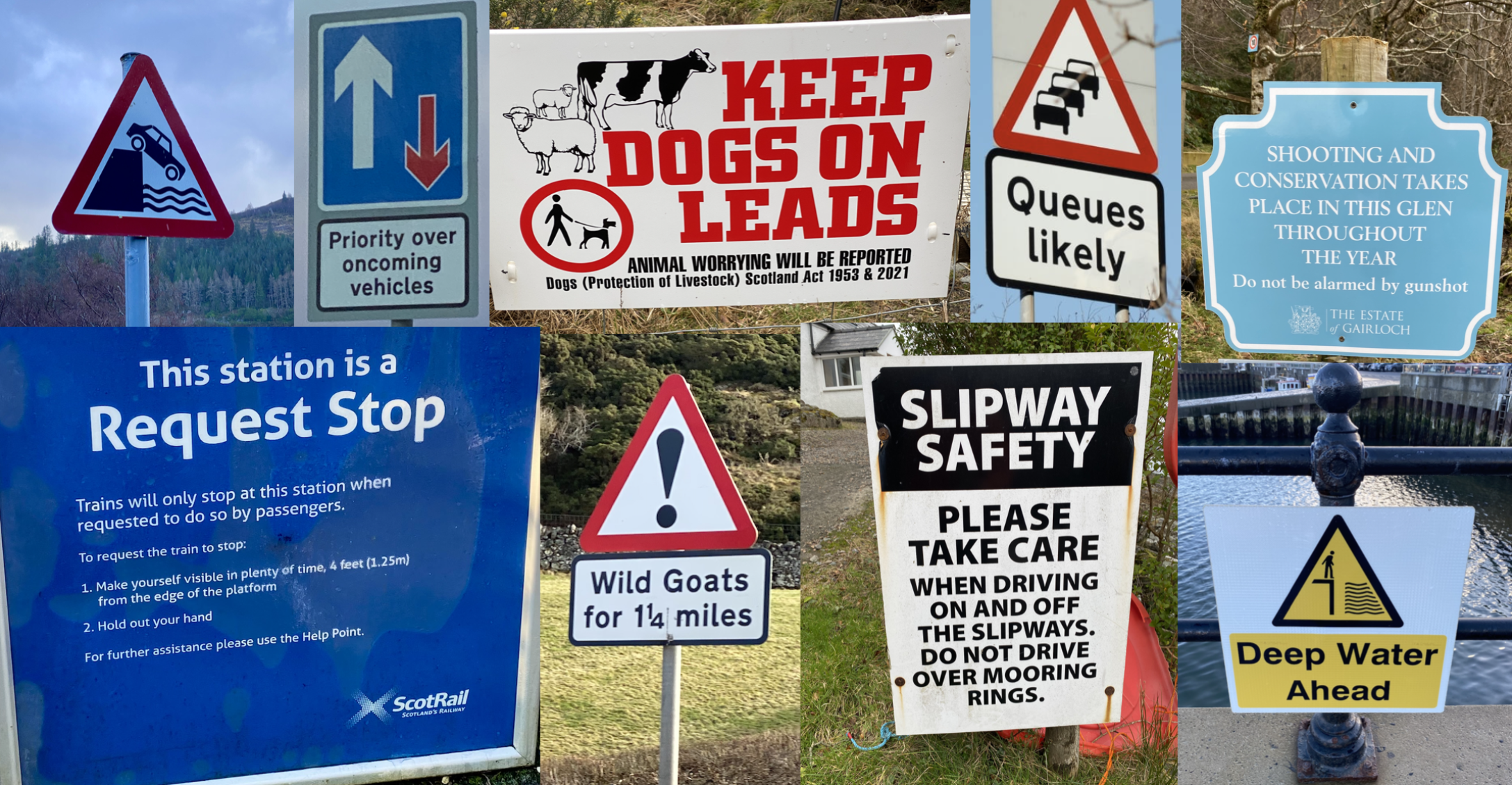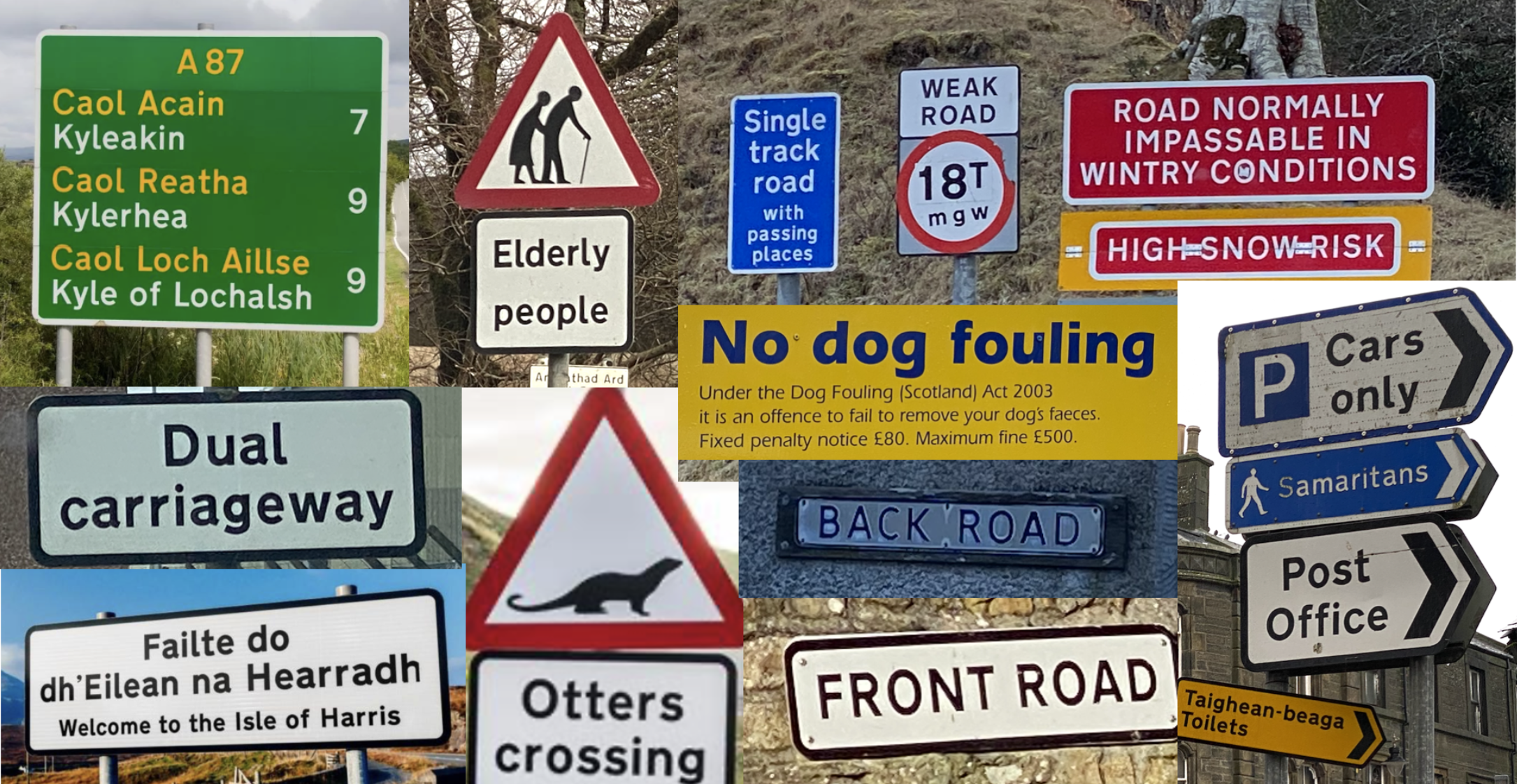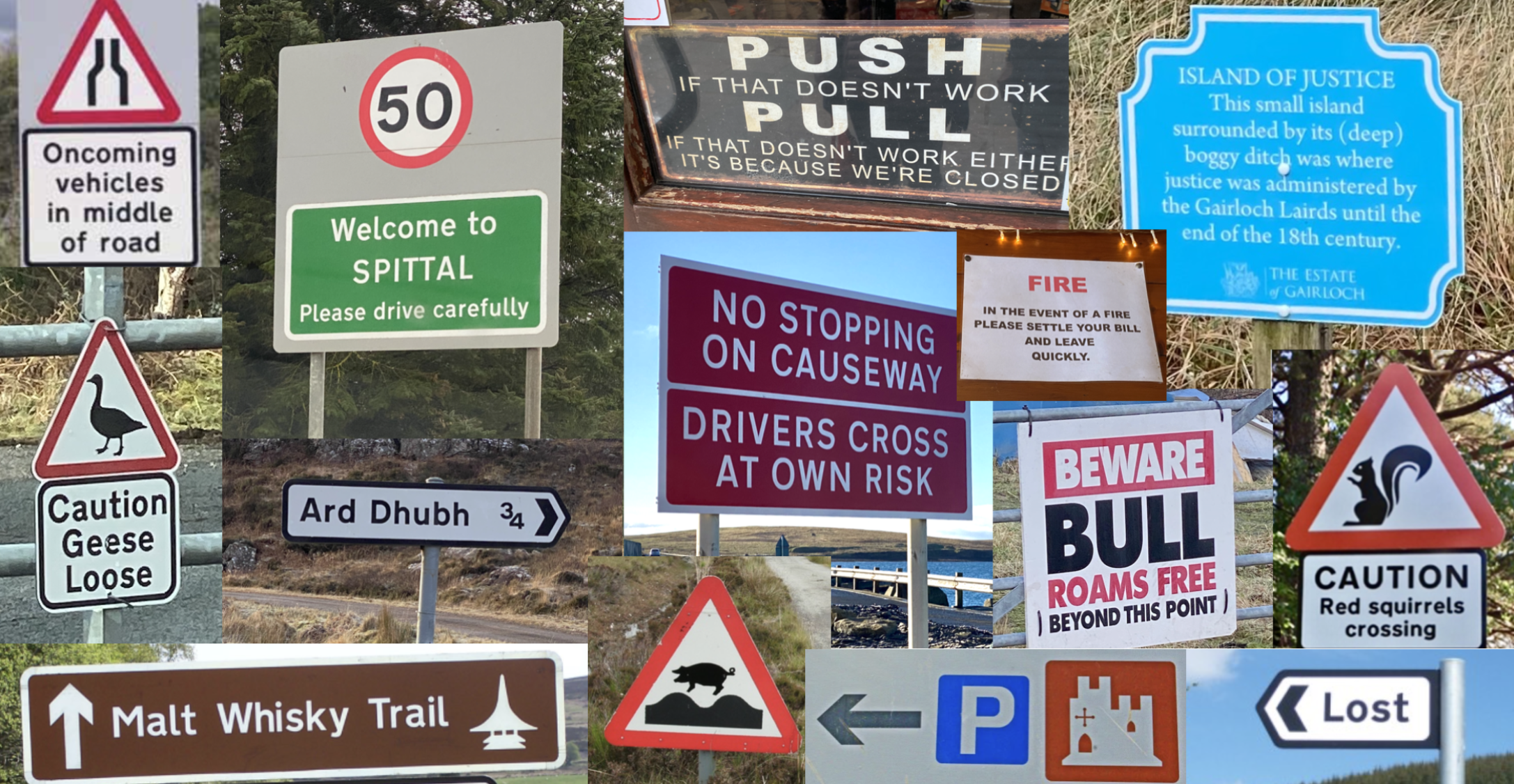March 2024
Are You Hearing Me?
01/03/24 12:44
THE WORDS
Even before we moved into our Scottish cottage, Judi and I were somewhat familiar with the language nuances between the U.S. and the U.K. Here are some of the common Scottish words and terms to which we’ve been reintroduced:
· In Scotland, potatos are tatties, French fries are chips, and our chips are their crisps. And if you eat too many of any of those, it’s not your pants that you’ll have trouble snapping, it’s your trousers.
· Over here, a jumper is a pullover garment, not someone about to bound off a ten-story ledge; and trainers are not the fit folks at the gym pushing you to do one more pull-up, rather, it’s what you wear on your feet when you’re there working out.
· You might think you would go to the supermarket with your shopping list and push a cart. But actually, you go to the grocery with your messages and wheel a trolley — that is, if you have a pound in your pocket to buy its temporary freedom from the others it’s chained to. And if you have a wee bairn at home, you’ll probably want to toss some nappies in that trolley. And maybe you’ll want a tin of shortbread biscuits and some squash to mix up and wash them down.
· You don’t keep a flashlight in the trunk so you can see what you’re doing at night when you pull onto the shoulder to change a tire. Rather, you keep a torch in your boot so that when you finally get to a passing place you can…try to read the microscopic instruction on the mini tyre compressor you’re glaring at since none of the cars in Scotland these days carry spares. (Good luck if you have a blowout after dark on an unlit single track in the mountains where there are no lay-bys. But I’ll save expounding on that for another blog.)
· There are plenty more. A toastie is not how you feel sitting in front of the coal stove, it’s a grilled sandwich. Being invited for a cuppa means you’re going to drink tea. If you have legal problems, you don’t look for a lawyer but a solicitor — unless you need somebody to defend you, and then you need a barrister. A burn won’t catch on fire because it’s a small stream. A moor is a swamp where numerous burns and the endless Scottish rain pool together. (There are more moors than you imagine.) A lass is a young man. A lassie is a young woman, and when several lassies get together to celebrate one’s upcoming betrothal, it’s a hen party. Bonnie means pretty. You can also say braw or tidy, which is the opposite of hackit. A coo is a shaggy cow, and shag has nothing to do with carpet. I’m sure you ken what I mean.
Even though we’re usually connecting all the dots, we still get caught off guard. Like last week:
Places to fill up the car with fuel are few and far between in the Highlands. If we’re traveling north, the closest station to the cottage is 19 miles, up and around the head of the loch in the village of Lochcarron. After that, it’s 29 miles to the next one in Kinlochewe, and another 32 to the one after that.
Last week, I pulled into Lochcarron station and noticed what looked like plastic flags on the handles of the green pumps. (In Scotland, opposite of what American drivers are used to, green-handles signify unleaded while black indicate diesel. Don’t get them confused!)
Thinking the streamers were tags indicating they were out, I walked in and asked Charlotte, “Do you not have gas today?”
“I’m afraid not,” she replied, “We’ll get some bottles in next week.” Her response slipped right by me because I was straightaway trying to decide if I wanted to chance going 29 or more miles north, or double back south 27 miles, past our cottage, just to fill up.
“But if you’re talking about the pumps,” Charlotte interrupted with a knowing look, “we have plenty of diesel and petrol.” Oh yeah. Petrol! That’s the word. It turns out that what I thought were flags were mini rolls of plastic gloves that pumpers can wear to minimize getting petroleum residue on the hands.
Yes, we’re still learning the lingo.
THE SIGNAGE
We’ve mastered driving on the left with the steering wheel on the right, but it’s the signage we constantly encounter — even on trails and in establishments — that have us questioning and chuckling and sometimes going back for a second look. Here are a few of our favorites that we’ve managed to snap as we’ve been out and about. We’ll let you draw your own conclusions.



THE ACCENT
This brings me to the trickiest part of communication in Scotland, the brogue. Let me say up front that I absolutely love the Scottish pronunciations and I adore the way certain phrases roll smoothly off the tongue like the fog rolling over the heather on the braes at morning’s first light. I also realize that, over here, we are the people with the accents. But honestly, sometimes trying to understand is like trying to figure out a word riddle, particularly when we encounter someone from Glasgow or a remote isle. Following a conversation with such a person, Judi and I will quickly and quietly step to the side and ask each other, “How much of that did you get?” It’s not uncommon to discover that we each heard something entirely different.
Interestingly, those from over the southern border also have a hard time communicating with some of the Scots. There’s a story about a Scotsman walking through a field. He sees a man drinking water from a pool with his hand. The Scotsman shouts “Awa ye feel hoor that’s full O’ coos Sharn.” (Rough translation: Don't drink the water, it's full of cow…pies.) The man yells, “I’m an Englishman. Speak English. I don't understand you.” The Scotsman shouts back, “I said, use both hands; you'll get more in.”
The point to all of this is that good communication is a two-way venture. The speaker and the hearer must be on the same wavelength. Eye contact is critical because facial expressions give valuable insights to what’s really being said. And clear communication takes time. Judi and I have agreed that our extended time together — without her heading off to a tennis match or me rushing to the airport for another five-day business trip — has forced us to verbally process what each other is saying on a deeper level than we have experienced for many years.
You don’t have to come to Scotland to improve your communication, but if you do, you’re guaranteed a dialectal and cultural bounty to boot. As the Scots say, it will be pure dead brilliant.
Even before we moved into our Scottish cottage, Judi and I were somewhat familiar with the language nuances between the U.S. and the U.K. Here are some of the common Scottish words and terms to which we’ve been reintroduced:
· In Scotland, potatos are tatties, French fries are chips, and our chips are their crisps. And if you eat too many of any of those, it’s not your pants that you’ll have trouble snapping, it’s your trousers.
· Over here, a jumper is a pullover garment, not someone about to bound off a ten-story ledge; and trainers are not the fit folks at the gym pushing you to do one more pull-up, rather, it’s what you wear on your feet when you’re there working out.
· You might think you would go to the supermarket with your shopping list and push a cart. But actually, you go to the grocery with your messages and wheel a trolley — that is, if you have a pound in your pocket to buy its temporary freedom from the others it’s chained to. And if you have a wee bairn at home, you’ll probably want to toss some nappies in that trolley. And maybe you’ll want a tin of shortbread biscuits and some squash to mix up and wash them down.
· You don’t keep a flashlight in the trunk so you can see what you’re doing at night when you pull onto the shoulder to change a tire. Rather, you keep a torch in your boot so that when you finally get to a passing place you can…try to read the microscopic instruction on the mini tyre compressor you’re glaring at since none of the cars in Scotland these days carry spares. (Good luck if you have a blowout after dark on an unlit single track in the mountains where there are no lay-bys. But I’ll save expounding on that for another blog.)
· There are plenty more. A toastie is not how you feel sitting in front of the coal stove, it’s a grilled sandwich. Being invited for a cuppa means you’re going to drink tea. If you have legal problems, you don’t look for a lawyer but a solicitor — unless you need somebody to defend you, and then you need a barrister. A burn won’t catch on fire because it’s a small stream. A moor is a swamp where numerous burns and the endless Scottish rain pool together. (There are more moors than you imagine.) A lass is a young man. A lassie is a young woman, and when several lassies get together to celebrate one’s upcoming betrothal, it’s a hen party. Bonnie means pretty. You can also say braw or tidy, which is the opposite of hackit. A coo is a shaggy cow, and shag has nothing to do with carpet. I’m sure you ken what I mean.
Even though we’re usually connecting all the dots, we still get caught off guard. Like last week:
Places to fill up the car with fuel are few and far between in the Highlands. If we’re traveling north, the closest station to the cottage is 19 miles, up and around the head of the loch in the village of Lochcarron. After that, it’s 29 miles to the next one in Kinlochewe, and another 32 to the one after that.
Last week, I pulled into Lochcarron station and noticed what looked like plastic flags on the handles of the green pumps. (In Scotland, opposite of what American drivers are used to, green-handles signify unleaded while black indicate diesel. Don’t get them confused!)
Thinking the streamers were tags indicating they were out, I walked in and asked Charlotte, “Do you not have gas today?”
“I’m afraid not,” she replied, “We’ll get some bottles in next week.” Her response slipped right by me because I was straightaway trying to decide if I wanted to chance going 29 or more miles north, or double back south 27 miles, past our cottage, just to fill up.
“But if you’re talking about the pumps,” Charlotte interrupted with a knowing look, “we have plenty of diesel and petrol.” Oh yeah. Petrol! That’s the word. It turns out that what I thought were flags were mini rolls of plastic gloves that pumpers can wear to minimize getting petroleum residue on the hands.
Yes, we’re still learning the lingo.
THE SIGNAGE
We’ve mastered driving on the left with the steering wheel on the right, but it’s the signage we constantly encounter — even on trails and in establishments — that have us questioning and chuckling and sometimes going back for a second look. Here are a few of our favorites that we’ve managed to snap as we’ve been out and about. We’ll let you draw your own conclusions.



THE ACCENT
This brings me to the trickiest part of communication in Scotland, the brogue. Let me say up front that I absolutely love the Scottish pronunciations and I adore the way certain phrases roll smoothly off the tongue like the fog rolling over the heather on the braes at morning’s first light. I also realize that, over here, we are the people with the accents. But honestly, sometimes trying to understand is like trying to figure out a word riddle, particularly when we encounter someone from Glasgow or a remote isle. Following a conversation with such a person, Judi and I will quickly and quietly step to the side and ask each other, “How much of that did you get?” It’s not uncommon to discover that we each heard something entirely different.
Interestingly, those from over the southern border also have a hard time communicating with some of the Scots. There’s a story about a Scotsman walking through a field. He sees a man drinking water from a pool with his hand. The Scotsman shouts “Awa ye feel hoor that’s full O’ coos Sharn.” (Rough translation: Don't drink the water, it's full of cow…pies.) The man yells, “I’m an Englishman. Speak English. I don't understand you.” The Scotsman shouts back, “I said, use both hands; you'll get more in.”
The point to all of this is that good communication is a two-way venture. The speaker and the hearer must be on the same wavelength. Eye contact is critical because facial expressions give valuable insights to what’s really being said. And clear communication takes time. Judi and I have agreed that our extended time together — without her heading off to a tennis match or me rushing to the airport for another five-day business trip — has forced us to verbally process what each other is saying on a deeper level than we have experienced for many years.
You don’t have to come to Scotland to improve your communication, but if you do, you’re guaranteed a dialectal and cultural bounty to boot. As the Scots say, it will be pure dead brilliant.
